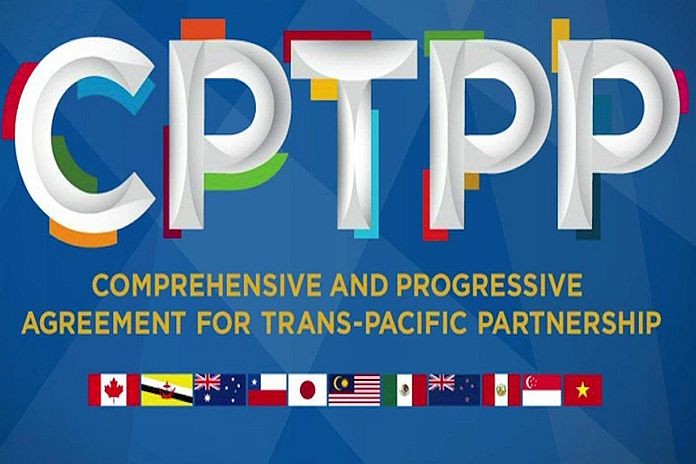By Shihoko Goto, Wilson Center
When Taiwan made its bid to join the CPTPP in September, a week after China officially declared its interest in joining, there was speculation about the implications of the timing. Taipei could not afford to wait to request entry once Beijing got in the game. Yet the CPTPP is at the heart of mapping out Taiwan’s long-term survival, not just a means to remain competitive in global markets.
Taipei is facing formidable military pressure from Beijing. In a television interview in October, Taiwanese President Tsai Ing-wen stressed that threats from Beijing were growing daily. In response the United States has galvanised like-minded countries within and beyond the Indo-Pacific to prepare to come to Taiwan’s defence should the need arise.
Yet the schism grows between the United States (and its partners and allies) preparedness to come to the physical defence of Taiwan and their readiness to support Taiwan’s ability to continue remaining economically competitive.
For now, Taiwan’s economy is not simply doing well – it is flourishing. Its unique position in the global supply chain has become all too clear during the COVID-19 pandemic. Taiwan’s GDP expanded in 2020 when the majority of economies worldwide shrunk drastically. Demand for its technology exports continues to be robust. Taiwanese industries play a pivotal role in supplying international markets with high-capacity semiconductors. Domestic investment remains strong, and the wooing of Taiwanese chipmakers by overseas manufacturers continues to intensify.
Nevertheless, the economic environment that Taiwan may find itself in the long term is as fraught with risks as its security landscape – but without the same sort of concerted regional support. Taipei finds itself amid a newly emerging regional trade architecture from which it is increasingly at risk of being marginalised. Taiwan’s bid to join the CPTPP not only highlights the risk of marginalisation that it faces as the Indo-Pacific becomes the centre of multilateral and bilateral trade deals, but it also underscores the need for a greater US economic presence in the region. The lack of a collective economic security vision, unlike a roadmap for regional military security, makes Taiwan’s future prospects more vulnerable.
In theory, Taipei has a fighting chance of joining the CPTPP, given that it is on equal footing with Beijing. Both are seeking membership at the same time and will have to meet the same requirements for entry. Taiwan should have the upper hand, since it has met more of the criteria for accession and is also prepared to make the necessary concessions to be considered. And unlike the Regional Comprehensive Economic Partnership agreement, of which China is a founding member, current CPTPP members including Japan, Australia and New Zealand have stepped up efforts to vocalise support for Taiwan.
Still, whether the 11 existing CPTPP members have the political will to risk a significant fallout with China for allowing Taiwan to join is debatable. The members need to consider aligning the security risks they have verbally committed to taking in Taiwan’s defence with the risks they should be prepared to take in defence of Taiwan’s economic survival.
The Biden administration has overcome its reluctance to enter new trade deals and has resumed negotiations with Taipei. The rapidly shifting landscape since the bilateral Trade and Investment Framework was signed in 1994 requires more than an end to the longstanding conflict over agricultural import restrictions or lowering tariffs more broadly. What Taiwan needs most is a demonstration of firm US and regional long-term commitment to support the government and its economy as much as its military defence.
Taiwan has thrived to date as a global player despite having only signed a limited amount of trade deals with select countries, including economic cooperation agreements with New Zealand and Singapore. But as the Indo-Pacific becomes the epicentre of integrated deals that will make trade far more efficient, cost-effective, and harmonised, Taiwan is in danger of becoming less attractive for investors precisely because it is not part of the trade networks.
For Taiwan to remain a flourishing and prosperous democracy, it needs not only strong defensive support from its partners, but also their backing to remain an integral part of the global economy. What’s more, its efforts to join the CPTPP must be acknowledged as a political manoeuvre as much as economic policy. By joining the CPTPP, the legitimacy of the Taiwanese government will be advanced, and the international community’s support for Taipei will also be made clear.
At the same time, it offers an opportunity for the 11 CPTPP members to step up to the plate and support Taiwan politically even without the United States. Actively supporting and considering Taipei’s application to join the CPTPP will test the resolve and the political savvy of member countries. Nothing will make more clear the commitment of the international community to defend and protect Taipei than its welcoming of Taiwan as a member of the CPTPP.
Shihoko Goto is Acting Director of the Asia Program and Deputy Director for Geoeconomics at the Wilson Center.
This article originally appeared on EastAsiaForum on November 19, 2021.





